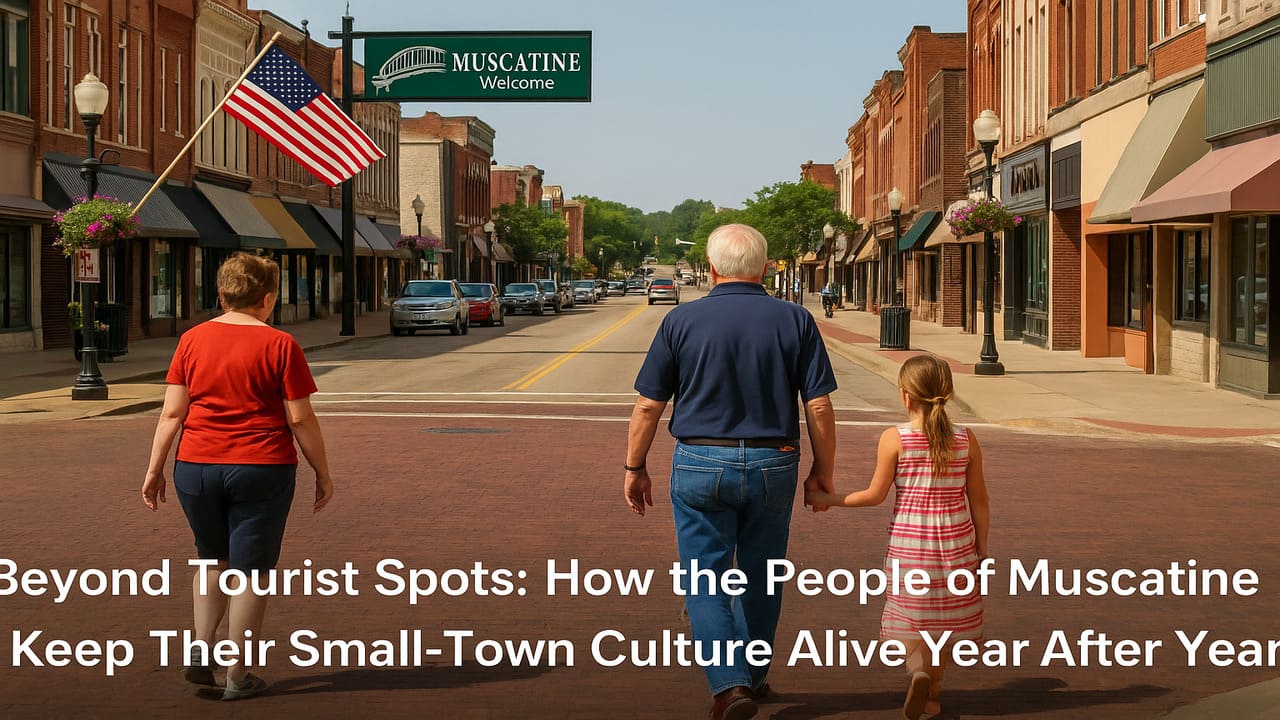
Meet Muscatine – While visitors to Muscatine often arrive with camera-ready intentions capturing the Mississippi Riverfront. The historic downtown district, or the famed Mark Twain Overlook those who stay a little longer quickly realize something deeper. Behind the quaint facades and seasonal festivals lies a People of Muscatine who keep protect, and evolve their small-town culture with remarkable devotion.
Muscatine, Iowa, may be known for its pearl button history and scenic river views, but for locals, what makes the city truly special isn’t found in tourist brochures it’s found in the quiet rituals, community-driven efforts, and multi-generational traditions that define daily life.
Ask any Muscatine resident where their favorite place in town is, and chances are, it’s not a museum or a landmark it’s the familiar corner café, a favorite park bench, or a neighbor’s porch where they’ve shared stories for decades.
Local establishments like Coffee Belt or Black Pearl Coffee Co. are more than just places to grab a drink they’re hubs where friends gather after school drop-offs, retirees catch up over newspapers, and students write college essays with a view of passing barges on the river.
Then there’s Weed Park, a local favorite not just for its rose gardens or playgrounds, but for the community events it hosts: summer music nights, charity walks, and the occasional small-town wedding. These spaces create a rhythm that allows residents to stay connected in ways that feel natural and personal.
Read More : Long Branch State Park: A Scenic Nature Getaway Just 45 Minutes from Mark Twain Lake
What sustains Muscatine’s culture across time is its intergenerational exchange of stories and values. In many families, it’s not uncommon for grandparents, parents, and children to all live in the same neighborhood or attend the same events year after year.
Oral storytelling remains a living tradition here. Whether it’s tales of how the button factories operated in the early 20th century, or memories of downtown before its modern renovations, Muscatine residents pass down local history through everyday conversation.
These stories are also preserved and amplified through groups like the Muscatine Historical Society and local library programs that invite older residents to share memories with schoolchildren ensuring that Muscatine’s identity stays rooted in the experiences of its people, not just its buildings.
Muscatine’s event calendar is fill with celebrations that go beyond performance and spectacle. From the Sweet Corn Festival to Almost Friday Fest at the riverfront, many of these events are entirely organize by local committees and volunteers people of Muscatine see these gatherings not just as fun, but as vital expressions of identity.
Take the Holiday Stroll, for example: a winter tradition that turns 2nd Street into a glowing corridor of music, handmade goods, and laughter. Local shops stay open late, kids roast marshmallows by fire pits, and choirs perform on street corners. It’s a community-wide effort to pause and reconnect, reminding everyone that the season is about presence more than presents.
Other beloved rituals include Fourth of July riverfront fireworks, high school football games, and open mic nights hosted by local musicians. The consistency of these events helps locals mark the passage of time, and reinforces the sense that this is a place where traditions are create by the people, not just preserve for visitors.
Read More : Weekend Vibes in Muscatine: Where to Find Locals Eat, Shop, and Hidden Gems
Small businesses in Muscatine aren’t just economic engines they’re guardians of local culture. Many are family-run, and nearly all rely on local loyalty rather than passing tourist traffic.
Shops like Sunshine River Gallery, Boonies on the Avenue, and Yacky Shack thrive because they reflect Muscatine values: authenticity, friendliness, and community-mindedness. Local entrepreneurs often collaborate with schools, sponsor youth teams, or participate in city cleanup days, further embedding their businesses into the town’s cultural fabric.
There’s also a growing interest in revitalizing downtown Muscatine while maintaining its character. New businesses are filling in historic storefronts, and initiatives like the Downtown Muscatine Alliance ensure that economic growth goes hand in hand with cultural preservation.
While the elders pass down history and the adults maintain tradition, young people are quietly shaping Muscatine’s next chapter. Local schools like Muscatine High School and L&M Community School District are playing key roles in blending heritage with innovation.
Through programs in journalism, arts, and agriculture, students are encourage to engage with their town’s identity in new ways. Some write blogs about local life; others document their surroundings through photography or social media a few even start their own micro-businesses inspired by Muscatine’s entrepreneurial spirit.